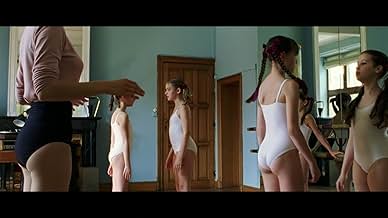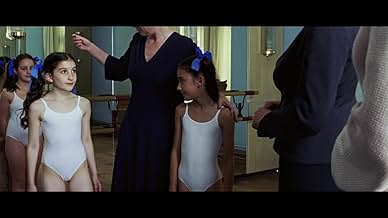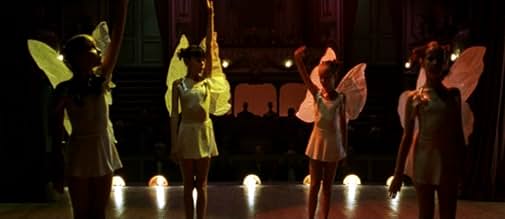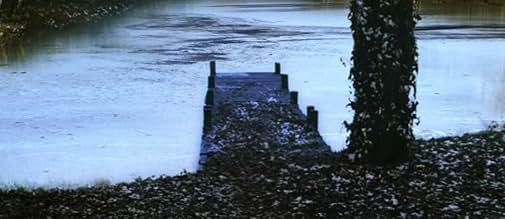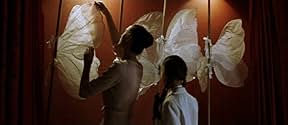Innocence
- 2004
- Tous publics
- 2h 2min
NOTE IMDb
6,8/10
6,6 k
MA NOTE
Un regard à l'intérieur d'un internat décalé pour jeunes filles.Un regard à l'intérieur d'un internat décalé pour jeunes filles.Un regard à l'intérieur d'un internat décalé pour jeunes filles.
- Récompenses
- 8 victoires et 2 nominations au total
Histoire
Le saviez-vous
- AnecdotesIn the 'extras' on the DVD release, the director relates that children playing unsupervised in nature (the forest, the pond) is a 'freeing' setting for them, an 'uncontrolled' environment to explore. Water is very important, as it is a highly visible medium in its many forms (including within or from underneath a surface), and it is necessary, sensual, and enjoyable, but also dangerous (the drowning), and evokes many emotions. Flowing water can also symbolize the passage of time. The dynamic of children relating to adults, not understating them or their actions, while seeing them as role models, is another dichotomy the director wanted to emphasize. Ambiguity and a 'dream-like' quality are also important elements of the film. She states they digitally enhanced or 'tweaked' colors in the film to 'non-realistic' tones, to achieve mood and lighting effect, particularly day for night shots. The director says she is not interested in explaining meaning: "... what I like in cinema is being lost. I like films I don't completely understand, so they stay with me longer after they're over," and, "I believe everyone can find their own stories within the film."
- GaffesWhen Bianca says goodbye to all the girls there is snow in the alley and they are all outside dressed with bare arms and bare legs. Then Bianca runs away in pouring rain. No more snow on the ground.
- Crédits fousThe entire set of credits is shown at the opening of the movie.
- ConnexionsFeatured in Women Make Film: A New Road Movie Through Cinema (2018)
- Bandes originalesOrchestral Suite from La Petite Renard Rusée
Composed by Leos Janácek
Libretto by Rudolf Tesnohlídek
Performed by Czech Philharmonic (as The Czech Philharmonic)
Conducted by Vaclav Talich
Commentaire à la une
There can't be many films that occupy your mind for many days afterwards, make you read the book they are based on, and then watch them again.
"Innocence" is one of those films and it is both beautiful and intriguing at the same time. It is based on a book by Frank Wedekind called "Mine-Haha or the corporeal education of girls", the only published fragment of his unfinished novel "Hildalla". It was first published in 1901 and although beautifully written it has much darker undertones than the film with references to a body cult of youth and natural beauty which would later become exploited by Nazi culture.
The film is very much a metaphor for a childhood world which is in many ways separate but also protected from that of adults. It plays in an isolated Girls School their children enter at the time when they start to make their own independent experiences of the world around them and ends with the onset of puberty and attainment of menarche, both symbolising the emotional and physical end of childhood. The cinematography is beautiful and reminded me in many ways of Tarkovsky with its symbolism and haunting images. However, the story can seem a little simplistic and linear times and often appears to demand more depth from the young child actors than they could possibly deliver.
Nevertheless this is a very interesting and thought-provoking film and well worth watching. The French dialogue often has a musical quality and as long as you're prepared to watch this in a calm and unhurried state of mind this is very rewarding and unusual cinematic experience.
"Innocence" is one of those films and it is both beautiful and intriguing at the same time. It is based on a book by Frank Wedekind called "Mine-Haha or the corporeal education of girls", the only published fragment of his unfinished novel "Hildalla". It was first published in 1901 and although beautifully written it has much darker undertones than the film with references to a body cult of youth and natural beauty which would later become exploited by Nazi culture.
The film is very much a metaphor for a childhood world which is in many ways separate but also protected from that of adults. It plays in an isolated Girls School their children enter at the time when they start to make their own independent experiences of the world around them and ends with the onset of puberty and attainment of menarche, both symbolising the emotional and physical end of childhood. The cinematography is beautiful and reminded me in many ways of Tarkovsky with its symbolism and haunting images. However, the story can seem a little simplistic and linear times and often appears to demand more depth from the young child actors than they could possibly deliver.
Nevertheless this is a very interesting and thought-provoking film and well worth watching. The French dialogue often has a musical quality and as long as you're prepared to watch this in a calm and unhurried state of mind this is very rewarding and unusual cinematic experience.
Meilleurs choix
Connectez-vous pour évaluer et suivre la liste de favoris afin de recevoir des recommandations personnalisées
- How long is Innocence?Alimenté par Alexa
Détails
- Date de sortie
- Pays d’origine
- Langue
- Aussi connu sous le nom de
- L'école
- Lieux de tournage
- Parc du Cinquantenaire, Bruxelles, Belgique(walking to new school)
- Sociétés de production
- Voir plus de crédits d'entreprise sur IMDbPro
- Durée2 heures 2 minutes
- Couleur
- Mixage
- Rapport de forme
- 2.35 : 1
Contribuer à cette page
Suggérer une modification ou ajouter du contenu manquant



